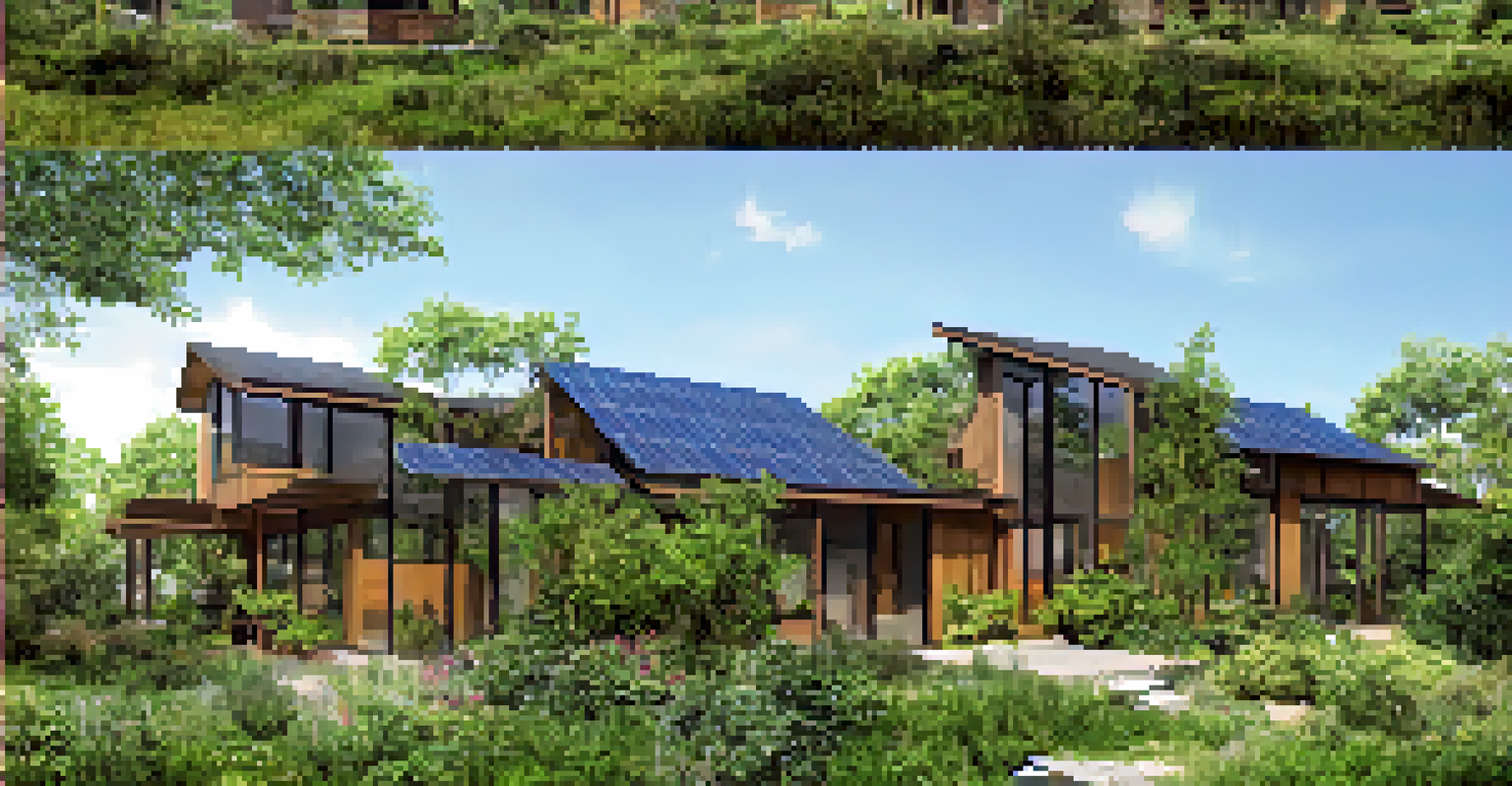Future Predictions: Real Estate Markets Post-Pandemic Analysis

Shifts in Buyer Preferences and Demographics
The pandemic has dramatically shifted what buyers are looking for in a home. Many now prioritize space for remote work, leading to a surge in demand for larger homes and properties with dedicated office spaces. Additionally, younger generations, like millennials, are becoming a significant force in the market as they enter home-buying age, further shaping demand.
The future of real estate will be defined by the intersection of technology and human connection.
This change in buyer preferences means that suburban and rural areas are gaining popularity over urban centers. People are seeking larger backyards and quieter neighborhoods, where they can enjoy a more relaxed lifestyle, away from the hustle and bustle of city life. Real estate agents are noticing this trend, with many clients expressing interest in these areas.
As a result, we can expect to see continued growth in these regions, driving up property values. This shift not only impacts home prices but also influences the types of developments that will be prioritized in the future. Developers are likely to focus more on creating communities that cater to these evolving preferences.
The Rise of Remote Work and Its Impact
Remote work has become the new norm for many, and it's influencing real estate in profound ways. As companies realize that productivity can thrive outside of traditional office settings, employees are seeking homes that accommodate their new work-life balance. This has opened up opportunities for buyers to consider locations they never would have thought possible before.

With the flexibility of remote work, buyers are no longer tethered to their workplace locations. This newfound freedom allows them to explore markets that were previously overlooked, leading to a more competitive landscape in various regions. The demand for homes in these areas is likely to increase, affecting pricing and availability.
Shift to Suburban and Rural Homes
Post-pandemic, buyers are increasingly favoring suburban and rural properties for larger living spaces and a quieter lifestyle.
As we move forward, this trend could lead to a reimagining of urban planning and community development. Cities may need to adapt by creating more mixed-use spaces that accommodate both living and working needs, fostering a sense of community while catering to the remote workforce.
Technological Advancements Reshaping Real Estate
Technology has been a game changer in real estate, especially during the pandemic. Virtual tours, online listings, and digital transactions have become commonplace, making it easier for buyers to explore properties without stepping outside. This shift is likely to continue, as convenience becomes a top priority for consumers.
Sustainability isn't just a trend; it's a fundamental shift in how we will live and work together.
Moreover, advancements in data analytics and artificial intelligence are providing real estate professionals with valuable insights. These technologies enable agents to understand market trends better and predict buyer behavior, allowing for more informed decisions. A data-driven approach is becoming essential for anyone looking to thrive in this competitive landscape.
As technology evolves, we can expect even more innovations that will streamline the buying and selling process. From virtual reality to blockchain for secure transactions, these tools will enhance the overall experience for both buyers and sellers, making real estate transactions faster and more efficient.
Sustainability and Eco-Friendly Homes on the Rise
The pandemic has heightened awareness of health and environmental issues, leading many buyers to prioritize sustainability. Eco-friendly homes equipped with energy-efficient appliances and sustainable materials are becoming increasingly attractive. This trend reflects a broader societal shift towards mindful living and environmental responsibility.
As more people seek out green features, builders and developers are responding by incorporating sustainable practices into their projects. From solar panels to water-efficient landscaping, these features not only benefit the planet but also appeal to a growing demographic of environmentally conscious buyers. This shift is likely to shape future developments significantly.
Remote Work Changes Housing Demand
The rise of remote work is enabling buyers to explore new locations, impacting real estate markets and community planning.
In the long run, properties that emphasize sustainability are expected to retain higher value, as buyers become more informed about the benefits of eco-friendly living. This trend is not just a passing phase; it's a fundamental change in how we approach real estate and community development moving forward.
Urban vs. Suburban: The Ongoing Debate
The pandemic has sparked an ongoing debate between urban living and suburban life. While urban areas have long been seen as desirable for their convenience and culture, many people are now reconsidering this notion. The allure of spacious homes and outdoor areas in suburban settings is proving to be a strong counterpoint to city living.
This shift has led to a unique situation where both urban and suburban markets are evolving to meet changing preferences. Cities are beginning to adapt by enhancing green spaces and offering more residential options, while suburbs are investing in infrastructure to accommodate the influx of new residents. Each area is finding ways to attract buyers in a post-pandemic world.
As this trend continues, it will be fascinating to see how urban and suburban developments change over time. Will urban centers regain their appeal once life returns to a new normal, or will the suburban boom persist? The balance between these two lifestyles will likely continue to evolve, reflecting the diverse desires of modern homebuyers.
The Role of Interest Rates in Future Real Estate Trends
Interest rates play a crucial role in the real estate market, influencing buying power and housing affordability. As we navigate the post-pandemic landscape, many are keeping a close eye on how central banks will respond to economic recovery. Decisions regarding interest rates could significantly impact buyer behavior and market dynamics.
Lower interest rates have historically spurred home buying, making mortgages more affordable for many. However, as the economy stabilizes, there may be an eventual increase in rates, which could lead to a cooling of the housing market. Buyers will need to be strategic and prepared for potential changes as they search for their ideal homes.
Sustainability Drives Home Choices
Growing awareness of environmental issues is pushing buyers toward eco-friendly homes equipped with sustainable features.
Understanding the relationship between interest rates and real estate is essential for both buyers and sellers. While current conditions may favor buyers, future fluctuations may shift the balance, making it crucial to stay informed. Keeping an eye on these trends will help stakeholders make educated decisions in an ever-changing market.
Investment Opportunities in a Changing Market
As the real estate landscape transforms, new investment opportunities are emerging. Investors who can identify trends early on stand to gain significant advantages. From multi-family units in suburban areas to tech-driven commercial spaces, there are various avenues to explore, depending on market conditions and buyer preferences.
Moreover, the demand for rental properties is likely to remain strong, as many individuals and families continue to seek flexible living arrangements. Investors may find success in properties that cater to this growing demographic, particularly in areas experiencing an influx of new residents. Understanding local markets will be key to making informed investment choices.

In an evolving market, adaptability is essential. Investors who remain agile and responsive to changing conditions will be better positioned to capitalize on opportunities as they arise. With the right approach, the post-pandemic real estate landscape can offer a wealth of possibilities for savvy investors.